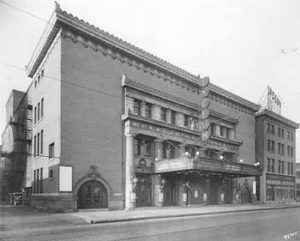
Lyceum Theater, Minneapolis
*On this date in 1898, a Black theatrical production of social consciousness was performed on a scale never before seen in Minnesota. It was titled “Cuba: a Drama of Freedom” and took place at the Lyceum Theater in Minneapolis.
This historical re-enactment or pageant was organized and performed by the Rondo community of St. Paul for a large audience of primarily well-to-do Minneapolis and St. Paul residents, black and white. The pageant depicted Cuba’s victory in achieving independence from Spain, which had occurred earlier that year as part of the Spanish-American War. The money raised from “Cuba’s” ticket sales went to fund the American Law Enforcement League of Minnesota. This local civil rights group was organized for Southern blacks facing segregation, disfranchisement, lynching, and economic subordination in the era of Jim Crow Laws.
“Cuba” was organized by mostly middle and upper-class African Americans and thus reflected the “genteel” sensibilities of the American elite. Although no recordings remain of the pageant, it can be gleaned from newspaper reports that it was written and performed using Victorian melodrama, music, and dance styles. The pageant glorified the American intervention in Cuba’s struggle for independence (ongoing since 1895), portraying a fashionable patriotism.
America was shown to be a purely benevolent power, heroically spreading liberty worldwide. However, the pageant especially glorified the contributions of black soldiers in the Spanish-American War, disrupting the racial attitudes many Americans held about Blacks in the military. Also, “Cuba” can be seen as a message of solidarity from blacks to Cubans, hinting at their shared oppression in the face of white racist domination.
In the months following the performances of “Cuba,” a debate erupted among black intellectuals in the Twin Cities about the pageant’s Cakewalk segment. Some felt that the Cakewalk, a popular form of dance that originated among slaves, perpetuated racist stereotypes, while others thought it a harmless form of entertainment. The dispute culminated with an oral debate between Fredrick McGhee, a prominent black attorney in St. Paul, and J.C. Reid, editor of The Appeal, the black newspaper in Minneapolis. McGhee, arguing that cake-walking was harmless, ruled the winner. The story of “Cuba” provides a window into many interwoven aspects of American domestic and transnational history.
Considering its context shows how historical events do not occur in isolation but are connected in unexpected and exciting ways across space and time; “Cuba” could not be fully understood without exploring St. Paul’s history, turn-of-the-century race relations, or US imperialism and the Spanish-American War. Likewise, “Cuba” enriches our understanding of these other historical themes or events. “Cuba” disrupts simplified historical narratives and challenges us to think outside the categories of history (American history, Black history, Minnesota history, etc.) that we commonly use to imagine the past.
“Cuba” can also be placed in conversation with our world today. For example, the Cakewalk debate provides a historical lens through which we can critically examine representations of race in popular entertainment today. Also, the connections between “Cuba” and other historical events and themes can be applied to the present; we can learn to think critically about how current events relate to each other and broader social, political, and economic processes.
Finally, “Cuba” allows us to reflect on how we can “read” history in our everyday lives outside of books or museums and gain a better understanding of our positions in society. The story of “Cuba” is thus much more complex, subtle, and multilayered than it may first appear. Reading and analyzing it provides an important opportunity to think critically about history and society and our roles within them.
Charlie Birge, supervised by Professor Peter Rachleff
and funded by Macalester College, St. Paul, Minnesota.